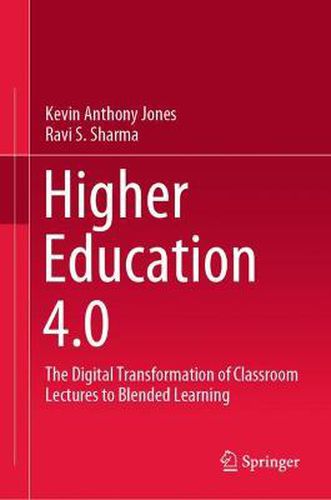Readings Newsletter
Become a Readings Member to make your shopping experience even easier.
Sign in or sign up for free!
You’re not far away from qualifying for FREE standard shipping within Australia
You’ve qualified for FREE standard shipping within Australia
The cart is loading…






This title is printed to order. This book may have been self-published. If so, we cannot guarantee the quality of the content. In the main most books will have gone through the editing process however some may not. We therefore suggest that you be aware of this before ordering this book. If in doubt check either the author or publisher’s details as we are unable to accept any returns unless they are faulty. Please contact us if you have any questions.
This book chronicles a 10-year introduction of blended learning into the delivery at a leading technological university, with a longstanding tradition of technology-enabled teaching and learning, and state-of-the-art infrastructure. Hence, both teachers and students were familiar with the idea of online courses. Despite this, the longitudinal experiment did not proceed as expected. Though few technical problems, it required behavioural changes from teachers and learners, thus unearthing a host of socio-technical issues, challenges, and conundrums.
With the undercurrent of design ideals such as tech for good , any industrial sector must examine whether digital platforms are credible substitutes or at best complementary. In this era of Industry 4.0, higher education, like any other industry, should not be about the creative destruction of what we value in universities, but their digital transformation. The book concludes with an agenda for large, repeatable Randomised Controlled Trials (RCTs) to validate digital platforms that could fulfil the aspirations of the key stakeholder groups - students, faculty, and regulators as well as delving into the role of Massive Open Online Courses (MOOCs) as surrogates for fees-free higher education and whether the design of such a HiEd 4.0 platform is even a credible proposition.
Specifically, the book examines the data-driven evidence within a design-based research methodology to present outcomes of two alternative instructional designs evaluated - traditional lecturing and blended learning. Based on the research findings and statistical analysis, it concludes that the inexorable shift to online delivery of education must be guided by informed educational management and innovation.
$9.00 standard shipping within Australia
FREE standard shipping within Australia for orders over $100.00
Express & International shipping calculated at checkout
This title is printed to order. This book may have been self-published. If so, we cannot guarantee the quality of the content. In the main most books will have gone through the editing process however some may not. We therefore suggest that you be aware of this before ordering this book. If in doubt check either the author or publisher’s details as we are unable to accept any returns unless they are faulty. Please contact us if you have any questions.
This book chronicles a 10-year introduction of blended learning into the delivery at a leading technological university, with a longstanding tradition of technology-enabled teaching and learning, and state-of-the-art infrastructure. Hence, both teachers and students were familiar with the idea of online courses. Despite this, the longitudinal experiment did not proceed as expected. Though few technical problems, it required behavioural changes from teachers and learners, thus unearthing a host of socio-technical issues, challenges, and conundrums.
With the undercurrent of design ideals such as tech for good , any industrial sector must examine whether digital platforms are credible substitutes or at best complementary. In this era of Industry 4.0, higher education, like any other industry, should not be about the creative destruction of what we value in universities, but their digital transformation. The book concludes with an agenda for large, repeatable Randomised Controlled Trials (RCTs) to validate digital platforms that could fulfil the aspirations of the key stakeholder groups - students, faculty, and regulators as well as delving into the role of Massive Open Online Courses (MOOCs) as surrogates for fees-free higher education and whether the design of such a HiEd 4.0 platform is even a credible proposition.
Specifically, the book examines the data-driven evidence within a design-based research methodology to present outcomes of two alternative instructional designs evaluated - traditional lecturing and blended learning. Based on the research findings and statistical analysis, it concludes that the inexorable shift to online delivery of education must be guided by informed educational management and innovation.